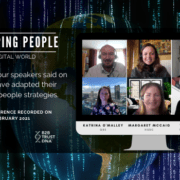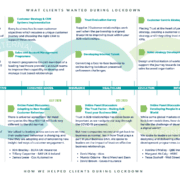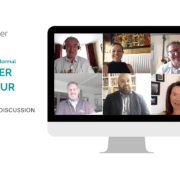Customer Data: The New Marketing Battleground
I believe that the Marketing and CRM disciplines are experiencing their most exciting period in history – certainly since my first involvement with them (over three decades)! Why? Because only now is it becoming economically viable to unlock the incredible value that’s often hidden in inaccessible and disconnected customer data.
I discussed this further at the SAS Analytics Experience conference in Amsterdam in October – check out my twitter feed for the commentary, using the hashtag #AnalyticsX
Improved data management is advantageous to many corporate disciplines – supply chain, stock/inventory management, finance, risk/compliance, logistics to name a few – but my specialism is Customer Management so it’s in the field of customer data that I’d like to address some opportunities that will deliver commercial benefits and improved competitiveness for your business.
In this blog I will set out why customer data is the new Marketing battleground, and in my next blog I will discuss how analytics are the weapons guidance systems that we need to win the battle. I’d like to apologise here to any pacifists reading this blog. I know that marketing isn’t life and death, and do not wish to promote corporate aggression, but there are some great analogies that I’d like to draw out!
Analytics or Research Reliance?
For decades we as marketers had to rely on market research to tell us things that we should already know about our customers e.g. their value, loyalty and buying patterns. I remember wondering why a company that stored the date of birth of all its customers needed to pay an external agency to ask them how old they were!
We did this of course because it was easier and cheaper to keep asking ‘dumb’ anonymous questions than to connect our own customer data, which was often jealously guarded in fiefdoms or business silos. This situation can still exist, and I’ve seen too many data warehousing projects torpedoed not because of the technical challenges but by internal politics.
Have we Silo’d our Data?
In my professional lifetime CRM systems, loyalty programmes, e-commerce, mobile/digital, instant feedback, and social listening have been added to our customer engagement arsenals. In many instances, however, they have been bolted on as new and separate silos, adding complexity and inconsistency to the customer experience.
It’s time to recognise that all these are about data! Each is both a consumer and producer of customer-related data, as indeed are all the ‘traditional’ sales, marketing, and customer service channels. According to research, 87% of marketers believe that data is their most underutilised asset (Forbes Teradata, 2015).
I have enjoyed spectating on the opposing arguments about the impact of loyalty programmes on actual retention and value. Both sides agree, however, that these programmes generate useful customer data! There are lots of similar academic arguments about the veracity of differing tools and approaches. The truth is that they all could work if there is the business will to break down the silos and to supply accurate, usable data.
WE CAN NOW SETTLE THESE ARGUMENTS FOR OUR OWN COMPANIES USING OUR OWN DATA!
This is why I would assert that customer data is the new marketing battleground. I passionately believe that companies will win more share of attention and wallet as they overcome their internal barriers to connect their data and deploy it through all their marketing tools (their arsenal) to improve personalisation and immediacy.
It’s also why I attended the SAS Analytics Experience conference, helping practitioners take big steps towards achieving these goals.
Data isn’t a weapon in itself – it needs to be generating insight that directs deployment! My next blog will consider the Customer Management ‘battlefronts’ (the drivers of value) and the way in which analytics are the ‘weapons guidance systems’ to realise the hard commercial benefits available.
- Customer Strategy in the B2B Membership Sector - May 27, 2025
- Build a B2B Customer Strategy - May 20, 2025
- Should you implement NPS in B2B? - January 22, 2025






